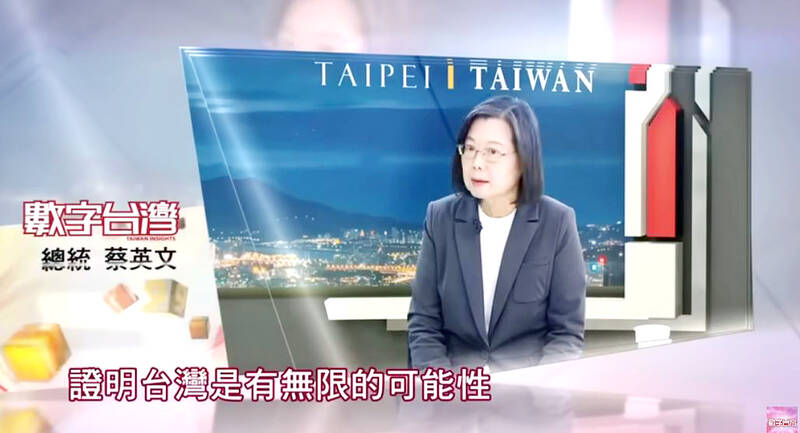Taiwan is preparing to develop its next generation of indigenous fighter jets, President Tsai Ing-wen (蔡英文) said.
Tsai revealed the plan in an interview with Era News that aired on Sunday evening in which she reflected on her two terms in office.
Tsai highlighted the government’s resolve to build up Taiwan’s autonomy in the area of defense systems.

Photo: Screen grab from Era News’ YouTube channel
As part of that commitment, the government plans to start developing the next generation of fighter aircraft, she said, without giving details.
Under the government’s defense autonomy plan, it would take delivery of 66 Brave Eagle advanced trainer aircraft by 2026, Tsai said, adding that 27 have already been delivered.
“If [the plan] is interrupted, it would be difficult to resume,” the president said, expressing hope that the next president would continue to support the development of the nation’s defense industry.
Tsai, whose second and final presidential term ends on May 20, reiterated that her defense policy centers on Taiwan gaining “defense autonomy.”
When other countries are contemplating joining forces to safeguard Taiwan, the main question is always whether Taiwan is firmly committed to self-defense, she said.
The government’s efforts to bolster its defense systems are driven in part by its desire to prove its capabilities and commitment to protect itself, she said.
Taiwan in September last year unveiled the prototype of its first indigenous submarine — the Hai Kun (海鯤), or “Narwhal” — which Tsai said was a milestone in the country’s efforts to obtain defense autonomy.
Submarine construction calls for systematic design and integration capabilities, and it is an all-encompassing undertaking that requires talent, she said.
The Hai Kun is expected to be delivered to the navy by the end of the year, after testing is completed.
Tsai in the interview also talked about cross-strait relations, saying it is the biggest challenge for “every administration and president of Taiwan.”
She said that bilateral relations essentially consist of two scenarios — either the positions of the two parties are in alignment and everything runs smoothly, or there is a conflict of interests.
When conflicts arise, it is crucial to manage the risks, she said.
Given the inherent differences in the relations between Taiwan and China, the government of Taiwan must navigate and mitigate those risks, she said.
Based on that perception, she adopted the position of “maintaining the status quo” across the Taiwan Strait when she took office in 2016, and she remains committed to that concept, she said.

EXPRESSING GRATITUDE: Without its Taiwanese partners which are ‘working around the clock,’ Nvidia could not meet AI demand, CEO Jensen Huang said Taiwan Semiconductor Manufacturing Co (TSMC, 台積電) and US-based artificial intelligence (AI) chip designer Nvidia Corp have partnered with each other on silicon photonics development, Nvidia founder and CEO Jensen Huang (黃仁勳) said. Speaking with reporters after he met with TSMC chairman C.C. Wei (魏哲家) in Taipei on Friday, Huang said his company was working with the world’s largest contract chipmaker on silicon photonics, but admitted it was unlikely for the cooperation to yield results any time soon, and both sides would need several years to achieve concrete outcomes. To have a stake in the silicon photonics supply chain, TSMC and

SILICON VALLEY HUB: The office would showcase Taiwan’s strengths in semiconductors and artificial intelligence, and help Taiwanese start-ups connect with global opportunities Taiwan has established an office in Palo Alto, one of the principal cities of Silicon Valley in California, aimed at helping Taiwanese technology start-ups gain global visibility, the National Development Council said yesterday. The “Startup Island Taiwan Silicon Valley hub” at No. 299 California Avenue is focused on “supporting start-ups and innovators by providing professional consulting, co-working spaces, and community platforms,” the council said in a post on its Web site. The office is the second overseas start-up hub established by the council, after a similar site was set up in Tokyo in September last year. Representatives from Taiwanese start-ups, local businesses and

‘DETERRENT’: US national security adviser-designate Mike Waltz said that he wants to speed up deliveries of weapons purchased by Taiwan to deter threats from China US president-elect Donald Trump’s nominee for US secretary of defense, Pete Hegseth, affirmed his commitment to peace in the Taiwan Strait during his confirmation hearing in Washington on Tuesday. Hegseth called China “the most comprehensive and serious challenge to US national security” and said that he would aim to limit Beijing’s expansion in the Indo-Pacific region, Voice of America reported. He would also adhere to long-standing policies to prevent miscalculations, Hegseth added. The US Senate Armed Services Committee hearing was the first for a nominee of Trump’s incoming Cabinet, and questions mostly focused on whether he was fit for the

SHARED VALUES: The US, Taiwan and other allies hope to maintain the cross-strait ‘status quo’ to foster regional prosperity and growth, the former US vice president said Former US vice president Mike Pence yesterday vowed to continue to support US-Taiwan relations, and to defend the security and interests of both countries and the free world. At a meeting with President William Lai (賴清德) at the Presidential Office in Taipei, Pence said that the US and Taiwan enjoy strong and continued friendship based on the shared values of freedom, the rule of law and respect for human rights. Such foundations exceed limitations imposed by geography and culture, said Pence, who is visiting Taiwan for the first time. The US and Taiwan have shared interests, and Americans are increasingly concerned about China’s